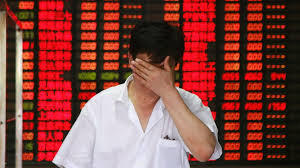Too bad Donald Trump isn't going to deliver a keynote at next week's World Economic Forum in Davos. But the Americans have been less keen on Davos for years.
Barack Obama has never attended (and Democratic front runner Bernie Sanders wouldn't be caught dead at Davos) because, frankly, a head of state hanging out with billionaires for days in Alpine splendor is lousy optics. Interestingly, Bill Clinton loved Davos, as well as the billionaires, which may explain his wife's slippage in recent polling.
That aside, hob-nobbing has never stopped other leaders, including Canadian prime ministers. After all, the photo ops back home are good and - while it may not be official like the G20 - trade and diplomatic deals sometimes get done here.
The Davos theme for 2016 is the future (Industry 4.0), but the present financial instability, not the future, will be the real talking point for these 2,500 participants (40 heads of state). China is top of the list due to its inability to control their unruly two cowboy stock exchanges, Shenzhen and Shanghai, operations separate from Hong Kong. Initially local, the problem is becoming global.
Last week, the alarm sounded by Forum regular George Soros has many people worried. He suggested that China's situation is starting to resemble "the crisis we had in 2008" -- a statement that will insure that the hottest ticket this week will be to hear or meet with Davos attendee Fang Xinghai, vice-chair of China's Securities Regulatory Commission.
The value of Davos is that it hosts sessions that provide global experts and insight who advise businesses how to evaluate and plan around the world's big geopolitical and economic shocks. Politically, Davos sometimes brokers actual political breakthroughs.For instance, the biggest Forum buzz surrounds "small private sessions" that will be held for key players in the Middle East wars. Saudi Arabia and Iran are sending their foreign ministers, and the U.S. is sending Vice President Joe Biden and Secretary of State John Kerry. These men hope to reach important agreements for the Syria summit in Geneva the following week. This is why the Swiss resort will be more of an armed camp than usual.
Other controversies will include an appearance by Ukraine President Petro Poroshenko, but not Russia's Vladimir Putin or Dmitry Medvedev. Poroshenko is a wonderful speaker, but his passionate speech last year about Russian terrorism received a luck warm response from the Davos audience of European tycoons who do, or did, big business with Moscow.
Today's problems may be uppermost in minds, but the overall theme is Germany's coined phrases "Industry 4.0 or the Fourth Industrial Revolution."
This guarantees the usual breakout panels on robots and automation's impact on employment, but the turnout of tech talent is both predictable and light. Veterans include: Bill Gates, cornerstone of the Forum; Cisco's John Chambers; Google's (Alphabet's) Eric Schmidt; Yahoo's Marissa Mayer; Wikipedia's Jimmy Wales; and Alibaba Group's Jack Ma.
But no matter what the sector, the consensus is that slow or no growth may be the new normal, with few exceptions. This is not new for Canada. But there was one tiny bright spot. In the World Economic Forum's fall Competitiveness rankings, Canada nudged up to 13th slot. The top three slots were occupied by Switzerland, Singapore and the United States.
The report applauded Canada's "highly efficient labor markets" and sound banks, but warned that the overvalued housing market could become a risk. It also concluded that "Canada should continue to foster innovation at the company level" because it ranks 26th in R&D and 23rd in the capacity to innovate (the US is first).
The Forum has impacted the world favorably and has become the premier meeting place for corporations. This unique position is due to the fact that founder Klaus Schwab expanded it from an executive retreat more than 30 years ago to a showcase and hothouse that encourages conversation and collaboration among business, charities, NGOs and all stakeholders.
On top of that are the celebrities invited to attend including Leonardo DiCaprio, Bono, Yo Yo Ma and Kevin Spacey, plus the simply splendid scenery and skiing.
First published National Post January 17, 2016

